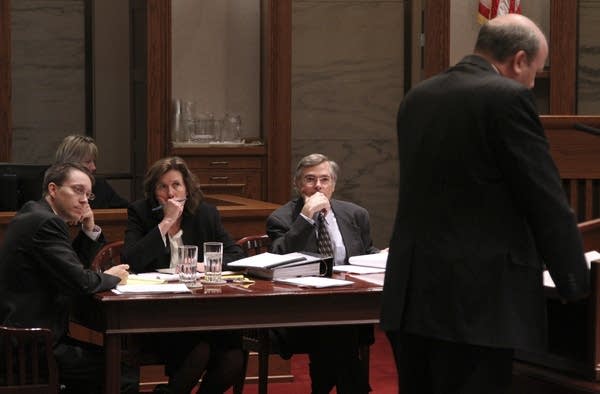Minn. high court denies GOP petition to check vote math
Go Deeper.
Create an account or log in to save stories.
Like this?
Thanks for liking this story! We have added it to a list of your favorite stories.

The Minnesota Supreme Court denied a GOP request Monday that could help determine who becomes Minnesota's next governor.
Five members of the Supreme Court heard arguments over a motion brought forward by Republican Tom Emmer: How election workers should square the number of ballots cast in each precinct with the number of people who signed in to vote.
The main arguments centered around whether the Supreme Court should directly interpret what is considered an out-of-date and ambiguous law or give credence to a rule created by the secretary of state that appeared to violate part of that law. Emmer's attorneys argued that the court should follow the direct interpretation of the law and require election workers to count the number of voter signatures to make sure it matches up with the number of ballots cast on election night.
"There are situations where excess votes occur," said Diane Bratvold, one of Emmer's attorneys. "Where there are more votes cast than there were voters ... It's important to declare the starting point for the number of voters."
Turn Up Your Support
MPR News helps you turn down the noise and build shared understanding. Turn up your support for this public resource and keep trusted journalism accessible to all.
But attorneys for Secretary of State Mark Ritchie and Democrat Mark Dayton argued that election workers shouldn't have to go through the laborious task of counting each signature and should instead rely on counting the receipts people are given when they sign in.
The five justices present peppered each attorney with questions about their interpretation of the law, whether it should be considered ambiguous or unambiguous and why local elections officials didn't follow laws that required them to toss out ballots if they find instances where more ballots were cast than voters registered.

Justice G. Barry Anderson asked that question of Solicitor General Alan Gilbert, who is representing the secretary of state.
"In acknowledged circumstances where there are overages, administrative officials have made the decision that those are de minimus and they're not going to take ballots out as the statute seems to require," Anderson said. "That seems to me to be in direct violation of the statutory language. I realize that that question may not be directly before us but shouldn't that be a matter of concern?"
"My understanding that the county election officials made the decision that those ballots were validly cast and they do have the ability to do that," Gilbert replied.
By tossing those ballots aside, Gilbert argued that some voters would be disenfranchised. Anderson countered that keeping the ballots in the pool disenfranchises other voters.

The question as to whether ballots should be set aside was central to Emmer's recount strategy. He currently trails Dayton by nearly 8,800 votes, a wide margin that people from both parties suggest is insurmountable. By setting aside ballots, Emmer's attorneys said that the pool of votes affected could have been as high as 12,000 or more.
They may have a tough hill to climb with the courts as well. During the oral arguments, Justice Christopher Dietzen questioned whether the statute was out of date for modern election times.
"At least as I read the affidavit of [Ramsey County elections manager Joe Mansky], he states that the term 'polling place roster' can be substituted for the term 'election register' and the term 'voter receipt' can be substituted for 'voter certificate,'" Dietzen said. "That seems plausible to me."
Emmer's attorney countered that it wasn't consistent with state statutes. Dayton's attorney, Marc Elias, argued that it makes perfect sense to count the receipts rather than the actual signatures if the goal is to get an accurate total. In any case, he said Emmer and his attorneys should have raised this issue before the election.

"Once the ballots are opened and once you know the vote total, courts should be skeptical about procedural challenges that could have been brought earlier," Elias said. "The time to challenge the voting process is before the election when the veil of ignorance still stands as to whether this process or that process benefits one candidate or another."
Two justices, David Stras and Paul Anderson, have recused themselves from the case. They will sit on the State Canvassing Board that will oversee the recount. The board's first meeting is Tuesday.




